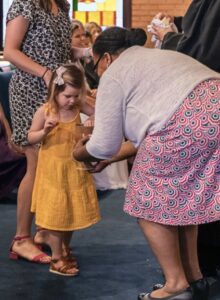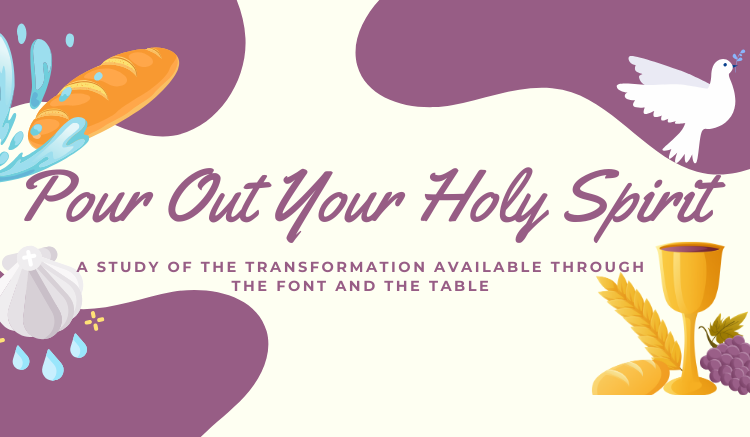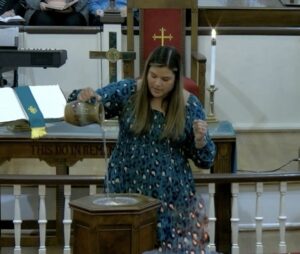Tensions were palpable. Everyone was moving quickly, and arena security was visibly on alert. The concourse was loud as some three thousand people made their way out of the Saint Louis Dome at the conclusion of the 2019 Special Called General Conference of the United Methodist Church.
Cameras flashed as the press sought to capture this pivotal moment, when how we handle our business and treat one another as the Church was on full display for the watching world. The chasm between opinions seemed to have only widened over the four days of the conference. It was down to the final moments when the vote for the denomination’s official stance on sexuality was cast and tallied. There was a quick and simple benediction given. We were told to go in peace, but I believe uneasiness was felt by all. No one really won that day.
I just needed to return my badge. I thought my turn down the side hallway would be a shortcut, but then I saw it there:
The table. Dozens of loaves, still in the cellophane. Jugs of grape juice, unopened.
The plan had been to conclude with worship including Holy Communion, but choices were made as the final day unfolded and time ran out. I wasn’t meant to walk through that back hall, and I have no clue what was done with that bread and juice. But the image of that table has been with me ever since as both haunt and guide.
The potential for a feast of grace. The gift of sacrament waiting to be received. The Body and blood of Christ not yet fully realized for this world.

Bishop Dease serving Holy Communion to little Luci. Photo by Haley Sanborn taken at the wedding of Shawna Darnall and Chris VandeLune.
My own faith has been nurtured by the United Methodist Church from the time I was baptized at four months old. Now an ordained Elder, I want to offer faithful leadership to my beloved congregation as we navigate an increasingly polarized society and face splintering within our denomination.
The sacraments of Baptism and Holy Communion are among our Triune God’s greatest gifts to the Church. They are means of grace, and actually impart God’s grace. This understanding is attributed to Augustine of Hippo in the fourth century, and was carried forward by Thomas Cranmer. The Wesley brothers were raised and became clergy within the Anglican Church, and maintained for the Methodist movement the sacraments as outward and visible signs for an inward grace.
It is God’s grace that flows through water, bread, and fruit of the vine. It is our responsibility to make ready the environment for God to move and to teach congregations so that they would come, eager and expectant, to receive the sacraments. For in the two sacraments, God offers us identity, belonging, purpose, and unity.
CENTERING THE SACRAMENTS – IT’S NOT A NEW IDEA
The sacraments have been central to the identity and success of the Methodist movement from its beginnings. Paul Chilcote summarized the Wesleys’ trust in the power of the sacraments, saying: “John and Charles Wesley directed a movement of spiritual renewal within the Church of England during the eighteenth century best described as an evangelical and sacramental revival. While this revival entailed a rediscovery of the Christian life as a way of devotion… it also reclaimed the central place of the sacraments in this spiritual journey. At a time when sacramental devotion was at low ebb in the life of their church, the Wesleys resituated their movement around the life-giving and grace-offering sacraments. They asserted that through the Sacrament of Baptism, God initiates the work of grace, and through the Sacrament of Holy Communion, God sustains believers in their grace-filled pilgrimage of faith. John and Charles Wesley’s theology and practice of sacraments emerged out of their larger vision of the Christian life as an act of worship… Their theology maintained a vital synthesis of sacramental grace and evangelical experience.”[1]
I hypothesized and found it to be true for the people of Trinity United Methodist Church that when the sacraments are central, God continues to spark and sustain revival. Trinity is a mid-sized church in, rapidly growing suburban, Fountain Inn, SC. Through qualitative and quantitative information gathering, increasing theological understanding had a positive impact on worship experience, boosted eagerness towards receiving the sacraments, and urged living sacramentally in the world.
For the entirety of 2023, I took every opportunity to enhance understanding of God working in and through the sacraments. This culminated with two sermons and a three-week evening study. There is correlation between the growth of the ministries of Trinity UMC and the teaching of the history, theology, and liturgical practices of Baptism and Holy Communion. Our living as disciples who make disciples of Jesus is now rooted in this, and we have seen the average worship attendance nearly double as well as demographics diversify.
While it’s impossible to share all the impact here, over the past year we have had three infant baptisms. Seven people asked to join the rotation for serving Communion, and fourteen individuals shared that they now never want to miss a Communion Sunday.
One person shared, with tears streaming down his face, how unbelievably meaningful it was for him to take Communion for the first time in two decades. He was raised in a tradition that told him he was unworthy to receive Holy Communion since he is divorced, and despite having worshipped at Trinity for a couple of years, it took the explicit teaching for him to feel truly invited to come forward and eat.
I asked that we ponder the questions from the Baptismal ritual: Do you confess Jesus Christ as your Savior, put your whole trust in his grace, and promise to serve him as your Lord, in union with the church which Christ has opened to people of all ages, nations, and races? As well as the words of the prayer during Communion: make us one with Christ, one with each other, and one in ministry to all the world. One lady emailed me to say, “I’ve been Methodist my whole life and never noticed that the sacraments not only extend something to us, but call us to do things. I never noticed the unity within the sacraments. If I’m being honest, I’m not actually sure I like it. But I can’t deny that it’s biblical and what Jesus was about.”
WHY DOES THIS MATTER SO MUCH NOW?
Christ instituted for us gifts to remember and be oriented to who God is, who we really are, and what we are meant to do and be about. God has already given us tools.
I want to be faithful as a disciple and a pastor in this divided world. I’m dismayed as I watch some denominational leaders allow administrative demands to edge out communal worship. I’m frightened by the hopeless tone and scarcity minded conversations of denominational restructuring. And I know I’m not alone.
I am not so naïve to think there is a fix for where we find ourselves, but I know God’s grace flows when gathered people come to the table and the font ready and excited. I have experienced it at even our largest denominational gatherings, when the environment is set and God mightily moves in water, bread, and fruit of the vine. I remain hopeful for our denomination and its future: that we would embody revival now and again be known for holding together evangelism and sacramentality, and that we would genuinely prioritize coming to wash and eat and drink in order to go on as the Body of Christ in the world, working for its redemption and transformation.
FURTHER RESOURCES
My hope in this work is that anyone who comes across it might find themselves a bit more in love with Baptism and Holy Communion.Ultimately, it is God who works through the water, bread, and cup. Increasing understanding of the theology, history, and ritual practice impacts how we come to receive and/or administer the sacraments, so if you are interested in further learning, I hope you will check these out.
The United Methodist Church’s official interpretive statements of Baptism and Communion:
By Water and the Spirit. Nashville TN: Discipleship Resources, adopted in 1996.
This Holy Mystery. Nashville, TN: Discipleship Resources, adopted in 2004.
Study Guides that help to further interpret these official statements for personal reflection:
Felton, Gayle. By Water and the Spirit Study Guide and Text: Making Connections for Identity and Ministry. Nashville TN: Discipleship Resources, 2014.
Felton, Gayle. This Holy Mystery Study Guide and Text. Nashville, TN: Discipleship Resources, 2004.
If you are interested in using the three-part study I created, you can email me at shawna [dot] darnall [at] gmail [dot] com.
[1] Paul W. Chilcote, “John and Charles Wesley,” in Justin Holcomb and David A. Johnson, eds., Christian Theologies of the Sacraments: A Comparative Introduction (New York, NY: New York University Press, 2017), p. 272.


This is a beautiful and well-developed academic presentation. More importantly, it represents a hope for our church. Thank you for an excellent work.